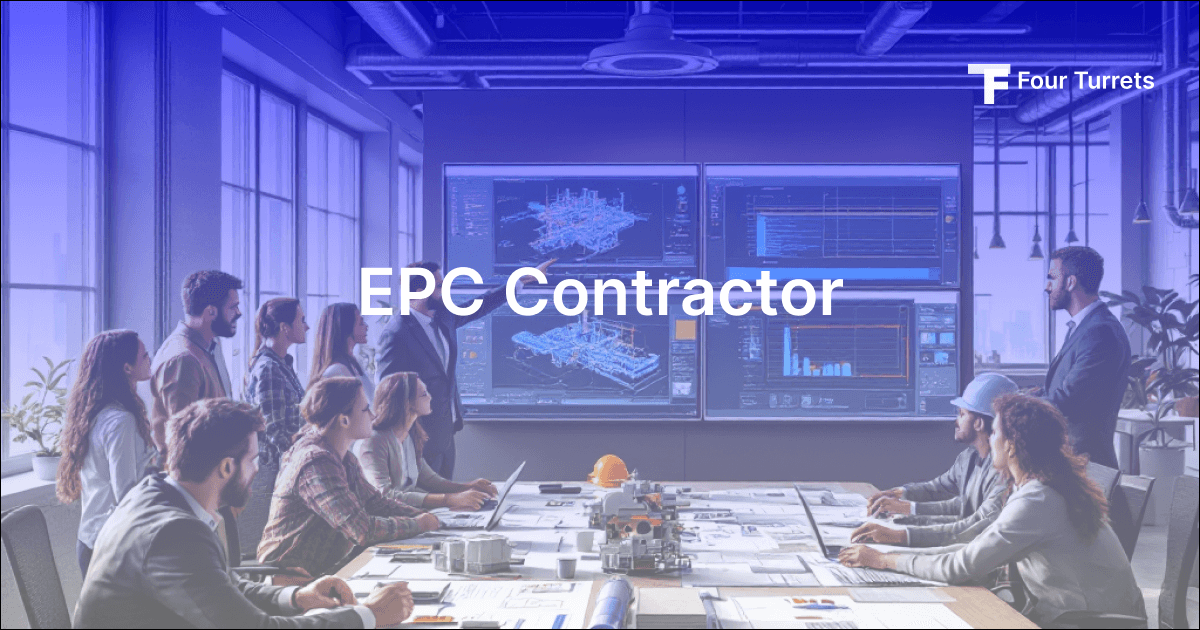The landscape of large-scale construction projects is complex, demanding meticulous planning, execution, and management. For a project owner, navigating the multifaceted demands of bringing a vision to life, from initial design to final handover can be daunting. This is where an Engineering, Procurement, and Construction (EPC contractor) steps in, offering a turnkey solution to manage the entire lifecycle of a construction project.
EPC contracting is a project delivery method where a single contractor takes on the responsibility for all aspects of a project: design, engineering, procurement of materials, and the actual construction. This integrated approach aims to streamline project delivery, ensure quality, and manage risks effectively.
Understanding the “EPC” in EPC Contractor
The acronym EPC stands for Engineering, Procurement, and Construction. Let’s break down what each of these critical phases entails when managed by an EPC contractor.
1. Engineering and Design: The Blueprint for Success
The engineering and design phase is the foundation of any successful construction project. Before any physical work begins, the EPC contractor undertakes detailed engineering. During this stage, the EPC contractor is responsible for:
- Feasibility Studies: Evaluating the project’s viability by examining technical, financial, and logistical aspects.
- Comprehensive Design: Crafting detailed engineering plans, specifications, and designs for the project. This involves various disciplines like civil, mechanical, electrical, and structural engineering.
- Scope Definition: Ensuring all parameters of the scope of work are clearly defined, including schedule and budget, agreed upon by all parties.
- Regulatory Compliance: Ensuring that engineering plans adhere to all local and national regulations, codes, and standards.
- Value Engineering: Proposing cost-effective solutions that enhance design and functionality without compromising quality, aligning with the project owner’s objectives.
- Risk Identification: Utilizing processes like Front-End Loading (FEL) or Front-End Planning (FEP) to establish a robust scope, budget, and timeline while identifying potential risks.
The role of engineering is pivotal, as it translates project requirements into actionable blueprints, forming the bedrock for successful execution. A strong engineering department within the contractor’s team is crucial to prevent rework and ensure the EPC project stays on track.
2. Procurement: Sourcing and Supplying for the Project
Once the engineering and design are finalized, the procurement phase begins. This is a highly detailed process involving the sourcing, purchasing, and inspection of all products, materials, services, and equipment required for construction. The EPC contractor is responsible for:
- Strategic Sourcing: Identifying and acquiring all essential materials, equipment, and components from suppliers, manufacturers, and distributors.
- Supplier Management: Evaluating and selecting suppliers based on quality, reliability, cost, and delivery timelines.
- Procurement Management Plan: Developing a detailed and strategic procurement management plan that outlines the schedule for acquiring each item and ensures timely delivery to maintain construction timelines. This plan provides transparency to the project owner.
- Supply Chain Management: Navigating the supply chain, monitoring inventory levels, lead times, and potential disruptions to maintain smooth operations.
- Logistics: Arranging transportation and delivery of materials to the construction site, considering costs and distances.
- Quality Assurance: Conducting inspections and verifications to ensure materials meet specified quality and safety standards.
Effective procurement is essential to maintaining the project’s budget and schedule. Some contractors utilize automation technology like barcoding and RFID to streamline inventory management.
3. Construction: Bringing the Vision to Life
The construction phase is where the meticulously planned designs and procured materials come together to create the physical structure. The EPC contractor spearheads the construction project management process, overseeing all on-site activities. Key responsibilities include:
- Project Management: Managing construction crews, subcontractors, and all on-site activities to ensure the project is built according to specifications, safety standards, and timelines.
- Schedule Adherence: Maintaining project schedules, milestones, and timelines to meet objectives. EPC contracts often include strict timelines, with penalties for delays.
- Cost Control: Monitoring construction expenses to ensure they remain within the predetermined budget. Many EPC contracts are lump-sum, where the contractor fixes the project’s cost upfront, giving the project owner cost certainty.
- Quality Control: Implementing and enforcing quality control procedures and performing inspections to ensure adherence to quality assurance criteria.
- Safety Management: Implementing and enforcing on-site safety protocols to protect all personnel and comply with regulatory guidelines.
- Constructability Reviews: Utilizing construction knowledge in earlier phases to optimize project execution. This involves reviewing mechanical, piping, electrical, civil, structural, instrumentation, and fire protection designs for efficient installation.
- Commissioning: After construction, the EPC contractor is responsible for testing and validating all systems to ensure they operate as intended before handing the project over to the project owner.
The contractor is responsible for delivering the project with optimum quality, on time, and within budget.
The Role of EPC Contractors: More Than Just Building
The role of EPC contractors extends beyond the individual phases of engineering, procurement, and construction. They act as a single point of responsibility for the project owner, simplifying communication and coordination. Key aspects of their role include:
- Integrated Project Delivery: Combining design, procurement, and construction into one seamless service.
- Risk Management: Assuming a significant portion of project risks, including financial, schedule, and performance risks. A clear scope of work in the construction contract helps define these responsibilities.
- Turnkey Solutions: Delivering a complete, operational facility to the project owner.
- Change Management: Evaluating the impact of any changes in project scope or unforeseen circumstances and adjusting plans accordingly.
Benefits of Engaging an EPC Contractor
Choosing an EPC contractor for a construction project, especially large-scale and complex ones like power plants or industrial facilities, offers several advantages for the project owner:
- Single Point of Responsibility: Simplifies communication and accountability, as the owner deals with one entity for all project phases.
- Cost Certainty: Often involves lump-sum agreements, providing the project owner with a fixed cost and minimizing financial uncertainty. The EPC contractor typically absorbs cost overruns.
- Schedule Adherence: Strict timelines and potential penalties incentivize the contractor to deliver on schedule.
- Quality Assurance: Contractors implement quality checks throughout all project phases.
- Risk Transfer: The EPC contractor assumes a significant portion of the project risks.
- Streamlined Project Delivery: An integrated approach leads to more efficient project delivery.
- Expertise and Specialization: EPC contractors bring specialized knowledge required for complex projects.
Conclusion
The EPC contractor plays a vital and comprehensive role in modern construction projects, especially those demanding high levels of expertise and integration. By managing the entire engineering and design, procurement, and construction phase under a single construction contract, they offer project owners a streamlined path to successful project delivery. Their ability to manage complex scopes of work, mitigate risks, and ensure projects are completed on time and within budget makes them an invaluable partner in developing critical infrastructure and industrial facilities.
If you’re embarking on a significant construction project and seeking a partner who can manage every detail from concept to completion, understanding the role of EPC contractors is the first step towards achieving your project goals.
If you are an EPC contactor and looking forward to producer finished engineering goods from Indian manufacturers, let’s work together! Join hands with team Four Turrets to start your fresh supply chain from India.
Frequently Asked Questions
Is appointing EPC contractor a better choice?
For Complex Projects: EPC contracts are prevalent in power plants, extensive industrial facilities, and infrastructure projects like water treatment plants due to their technical complexity and scale.
Risk Reduction for Owners: The EPC contractor assumes more risk, which can be highly beneficial for the project owner.
Financial Predictability: Lump-sum contracts offer cost certainty. This is often preferred by financial backers.
Streamlined Process: A single point of contact simplifies coordination and can lead to faster project delivery.
Focus on Core Business: Allows the project owner to focus on their core business while the EPC contractor handles the intricacies of the construction project.
What is the difference between EPC and general contractor?
While both EPC contractors and general contractors manage construction, their roles and responsibilities differ significantly. An EPC contractor provides a turnkey solution, responsible for the entire project lifecycle from engineering and design, through procurement, to construction and commissioning. They often take on greater project risk and work under a single construction contract that covers the entire scope of work. The EPC model is similar in concept to Design-Build projects but often implies a single entity or a prime contract with one entity for all three (E, P, C) components.
A general contractor, on the other hand, is typically brought in after the design phase is completed by a separate engineering firm. Their primary focus is on the construction phase, managing subcontractors and the building process. While they manage significant aspects of construction, they don’t usually handle the initial detailed engineering or the full procurement process in the same integrated way as an EPC contractor. The Design-Bid-Build model, where design and construction are separate phases and contracts, often involves a general contractor for the build phase.







